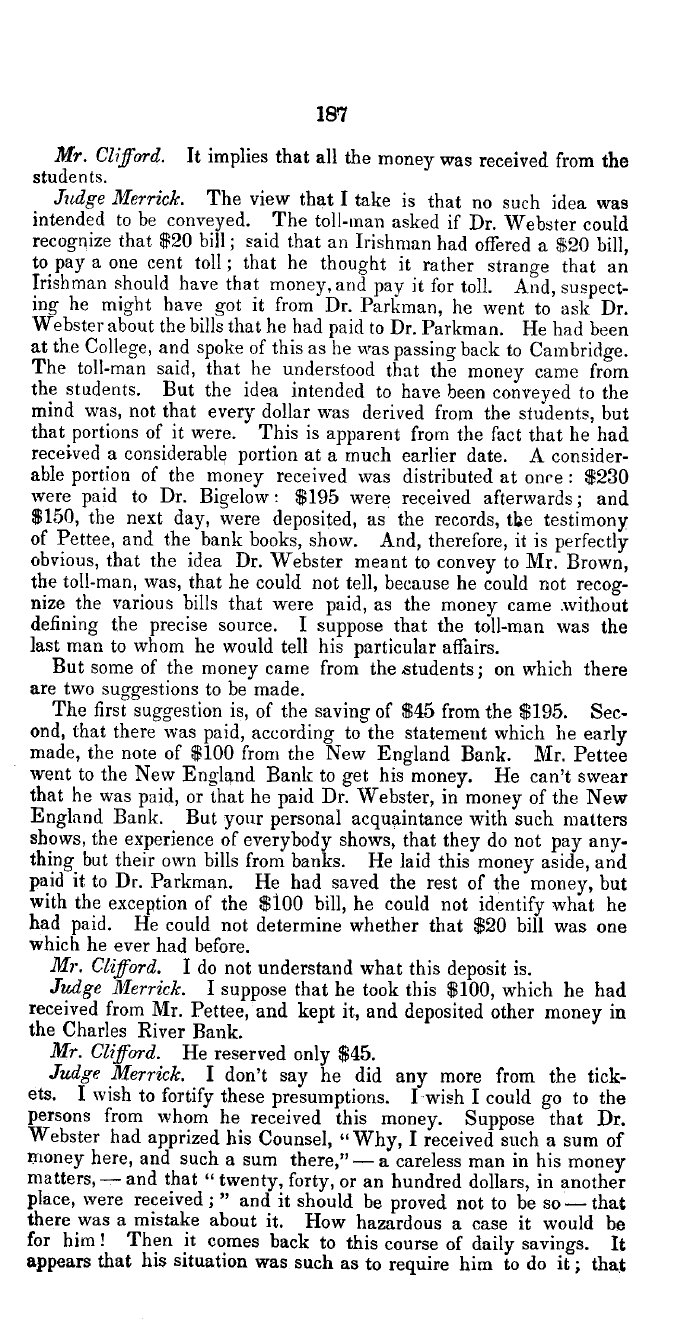|
187
Mr. Cliford. It implies that all the money was received from the
students.
Judge Merrick. The view that I take is that no such idea was
intended to be conveyed. The toll-man asked if Dr. Webster could
recognize that $20 bill; said that an Irishman had offered a $20 bill,
to pay a one cent toll ; that he thought it rather strange that an
Irishman should have that money, and pay it for toll. And, suspect-
ing he might have got it from Dr. Parkman, he went to ask Dr.
Webster about the bills that he had paid to Dr. Parkman. He had been
at the College, and spoke of this as he was passing back to Cambridge.
The toll-man said, that he understood that the money came from
the students. But the idea intended to have been conveyed to the
mind was, not that every dollar was derived from the students, but
that portions of it were. This is apparent from the fact that he had
received a considerable portion at a much earlier date. A consider-
able portion of the money received was distributed at once : $230
were paid to Dr. Bigelow : $195 were received afterwards; and
$150, the next day, were deposited, as the records, toe testimony
of Pettee, and the bank books, show. And, therefore, it is perfectly
obvious, that the idea Dr. Webster meant to convey to Mr. Brown,
the toll-man, was, that he could not tell, because he could not recog-
nize the various bills that were paid, as the money came .without
defining the precise source. I suppose that the toll-man was the
last man to whom he would tell his particular affairs.
But some of the money came from the students; on which there
are two suggestions to be made.
The first suggestion is, of the saving of 845 from the $1.95. Sec-
ond, that there was paid, according to the statement which be early
made, the note of $100 from the New England Bank. Mr. Pettee
went to the New England Bank to get his money. He can't swear
that he was paid, or that he paid Dr. Webster, in money of the New
England Bank. But your personal acquaintance with such matters
shows, the experience of everybody shows, that they do not pay any-
thing but their own bills from banks. He laid this money aside, and
paid it to Dr. Parkman. He had saved the rest of the money, but
with the exception of the $100 bill, he could not identify what he
had paid. He could not determine whether that $20 bill was one
which he ever had before.
Mr. Clifford. I do not understand what this deposit is.
Judge Merrick. I suppose that he took this $100, which he had
received from Mr. Pettee, and kept it, and deposited other money in
the Charles River Bank.
Mr. Cliff-d. He reserved only $45.
Judge Merrick. I don't say he did any more from the tick-
ets. I wish to fortify these presumptions. I wish I could go to the
persons from whom he received this money. Suppose that Dr.
Webster had apprized his Counsel, '° Why, I received such a sum of
money here, and such a sum there," -a careless man in his money
matters,- and that '° twenty, forty, or an hundred dollars, in another
place, were received ; " and it should be proved not to be so - that
there was a mistake about it. How hazardous a case it would be
for him ! Then it comes back to this course of daily savings. It
appears that his situation was such as to require him to do it ; that
|

